The vast majority of the Pullias Center for Higher Education’s research and reports are dedicated to equity among groups that have experienced oppression in our society. Below we have highlighted specific selected resources that can particularly help inform practitioners and policymakers who are looking to move the needle in a positive direction on issues of racial equity in higher education.
RECENT/FEATURED PUBLICATIONS
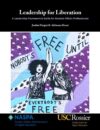
Leadership for Liberation: A Leadership Framework & Guide for Student Affairs Professionals
Jordan Harper and Adrianna Kezar
Pullias Center for Higher Education (2021)
This guide articulates a need for a new model of leadership - leadership for liberation. The provocative thesis argues for a bold and forward-thinking leadership that focuses on the systems, structures, and cultural norms that are the heart of our most challenging societal problems.
Categories: College Access, Racial Equity, Guides
adrianna kezar equity and leadership jordan harper leadership racial equity
Download 847.26 KB 12131 Downloads
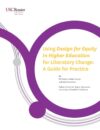
Using Design for Equity in Higher Education for Liberatory Change: A Guide for Practice
KC Culver, Jordan Harper, and Adrianna Kezar
Pullias Center for Higher Education (2021)
This toolkit helps design teams engage in this process of implementing the Design for Equity in Higher Education model, For each phase of the model, this toolkit provides a short description and offers some questions and suggestions to guide practice.
Categories: Delphi Project, Racial Equity, Guides
design thinking policymaking delphi project racial equity
Download 326.93 KB 57002 Downloads
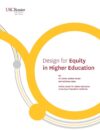
Design for Equity in Higher Education
KC Culver, Jordan Harper, and Adrianna Kezar
Pullias Center for Higher Education (2021)
A customized guide about liberatory design thinking processes that have been tested within college settings to support changes that enhance equity in policies and practices within institutions. This research is based on case studies of several institutions, including focus group interviews with the campus design teams and an analysis of artifacts. Profiles of two campuses that represent the trends of the data across a larger set of campuses is also included.
A companion guide to facilitate implementation of this model is available.
Categories: Delphi Project, Racial Equity, Guides
design thinking policymaking delphi project racial equity
Download 608.34 KB 21821 Downloads
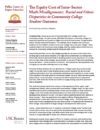
The Equity Cost of Inter-Sector Math Misalignment: Racial and Ethnic Disparities in Community College Student Outcomes
Federick Ngo and Tatiana Melguizo (2020)
A new study explores the equity cost of math misalignment by examining whether it is especially detrimental for these college-ready students to begin college in developmental math courses. Researchers summarize results from a study on the experience of inter-sector math misalignment (ISMM), when students who were deemed “college-ready” by high school standards were placed in developmental courses upon enrolling in a local community college. Given that racially minoritized students are more likely to be placed into developmental education courses and report being questioned about their abilities in those courses, they may experience more negative effects of being placed into developmental courses when they are actually college-ready.
Categories: College Access, Racial Equity, Math Equity
college access math equity racial equity tatiana melguizo
Download 310.76 KB 13594 Downloads
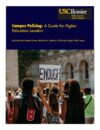
Campus Policing: A Guide for Higher Education Leaders
Jude Paul Matias Dizon, Maritza E. Salazar, Elif Yucel, Edgar Fidel Lopez (2020)
A new report written by Pullias Center researchers tackles the institutionalization of policing in higher education campus safety and management. By providing administrators with important perspectives, key takeaways, reflective questions, and specific recommendations, Campus Policing: A Guide for Higher Education Leaders acts as a guide for higher education leaders looking to proactively respond to issues of policing and racism on university campuses.
Categories: Racial Equity, Institutional Culture, Guides
racial equity
Download 546.55 KB 11894 Downloads
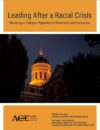
Leading After a Racial Crisis: Weaving a Campus Tapestry of Diversity and Inclusion
Sharon Fries-Britt and Adrianna Kezar (2020)
A report from the American Council on Education (ACE) on research exploring University of Missouri’s progress with diversity, equity, and inclusion in the years following the 2015-16 racial crisis on campus. Note: This document is hosted on the ACE website.
Categories: Institutional Culture, Student Success, Racial Equity
ACE administrator adrianna kezar DEI diversity institutional change institutional culture leadership lorelle espinosa racial equity student success
Download 206.54 KB 30624 Downloads
MONOGRAPHS/REPORTS
Corwin, Z. B., Maruco, T., Williams, N., Reichardt, R., Romero-Morales, M., Rocha, C., & Astiazaran, C. (2020). Beyond the board: Findings from the field. Pullias Center for Higher Education. (link)
Corwin, Z. B., Romero-Morales, M., Rocha, C., & Maruco, T. (2020). Bolstering first-year success through digital tools. Pullias Center for Higher Education. (link)
Corwin, Z. B., & Tierney, W. G. (2007). Getting there – and beyond: Building a culture of college-going in high schools. Pullias Center for Higher Education (formerly Center for Higher Education Policy Analysis). (link)
Fries-Britt, S., Kezar, A., Wheaton, M.M., McGuire, D., Kurban, E., & Dizon, J.P.M. (2020). Leading after a racial crisis: Weaving a campus tapestry of diversity and inclusion. American Council on Education. (link)
Kezar, A., Fries-Britt, S., Kurban, E., McGuire, D., & Wheaton, M.M. (2018). Speaking truth and acting with integrity: Confronting challenges of campus racial climate. American Council on Education. (link)
Kezar, A., & Holcombe, E. (2017). Creating a unified community of support: Increasing success for underrepresented students in STEM. CSU STEM Collaboratives Network. (link)
Tierney, W. G., Campbell, C. D., & Sanchez, G. J. (2004). The road ahead: Improving diversity in graduate education. Pullias Center for Higher Education (formerly Center for Higher Education Policy Analysis). (link)
JOURNAL ARTICLES
Holcombe, E. & Kezar, A., (2019). Ensuring Success Among First-Generation, Low-Income, and Underserved Minority Students: Developing a Unified Community of Support. American Behavioral Scientist. (link)
Howard, T., Woodward, B., Navarro, O., Huerta, A., Haro, B., & Watson, K. (2019). Renaming the Narrative, Reclaiming their Humanity: Black and Latino males’ Descriptions of Success. Teachers College Record. 121. 1-32. (link)
Huerta, A., McDonough, P., & Allen, W. (2018). Employing a Developmental Perspective to examine how young Men of Color Construct a College-going Identity. The Urban Review. 50. (link)
Huerta, A., & Rios-Aguilar, C. (2018). Treat a Cop like they are God: Exploring the Relevance and Utility of Funds of Gang Knowledge among Latino Male Students. Urban Education. (link)
Kezar, A. (2007). Learning from and with students: College presidents creating organizational learning to advance diversity agendas. NASPA Journal, 44(3), 578-609. (link)
Kezar, A. (2007). Tools for a time and place: Phased leadership strategies to institutionalize a diversity agenda. TheReview of Higher Education, 30(4), 413-439. (link)
Kezar, A., Eckel, P., Contreras-McGavin, M., & Quaye, S. J. (2008). Creating a web of support: An important leadership strategy for advancing campus diversity. Higher Education, 55(1),69-92. (link)
Kezar, A. J., & Holcombe, E. M. (2018). Challenges of Implementing Integrated Programs for Underrepresented Students in STEM: A study of the CSU STEM collaboratives. Educational Policy. (link)
Kezar, A., Hypolite, L., & Kitchen, J., (2019). Career self-efficacy: An underexplored research area for first generation, low-income, and underrepresented college students in a comprehensive college transition program. American Behavioral Scientist. (link)
Kezar, A., Lester, J., Glenn, W., & Nokamato, J. (2008). Examining organizational contextual features that affect implementation of equity initiatives. TheJournal of Higher Education, 79(2),125-159. (link)
Kezar, A., & Moriarty, D. (2000). Expanding our understanding of student leadership development: A study exploring gender and ethnic identity. Journal of College Student Development, 41(1), 55-69. (link)
Kolluri, S., & Tierney, W. (2018). College for All in Capitalist America: The post-secondary Emphasis in the Neoliberal age. Tertiary Education and Management, 1-12. (link)
Liera, R., & Dowd, A. C. (2018). Faculty learning at boundaries to Broker Racial Equity. The Journal of Higher Education. (link)
Melguizo, T. (2010). Are Students of Color more likely to Graduate from College if they Attend more Selective Institutions? Evidence from the First Cohort of Recipients and Non-recipients of the Gates Millennium Scholarship (GMS) program. Educational Evaluation and Policy Analysis, 32, 230-248. (link)
Melguizo, T. (2009). Are Community Colleges an Alternative path for Hispanic students to attain a Bachelor’s degree? Teachers College Record, 111 (1), 90-123. (link)
Melguizo, T. (2008). Quality matters: Assessing the Impact of Selective Institutions on Minority College Completion Rates. Research in Higher Education, 49(3), 214-236. (link)
Melguizo, T., & Chung, A. (2012). College Aid Policy and Competition for Diversity. The Review of Higher Education, 35(3), 403-430. (link)
Melguizo, T., & Wolniak, G. (2012). The Earnings Benefits of majoring in STEM fields among High Achieving Minority Students. Research in Higher Education, 53(4), 383-405. (link)
Porter, K. B., Posselt, J. R., Reyes, K., Slay, K. E., & Kamimura, A. (2018). Burdens and Benefits of Diversity Work: Emotion Management in STEM Doctoral Students. Studies in Graduate and Postdoctoral Education, 9(2), 127-143. (link)
Posselt, J. R. (2018). Rigor and Support in Racialized Learning Environments: The Case of Graduate Education. New Directions for Higher Education, 2018(181), 59-70. (link)
Posselt, J. R. (2014). Toward Inclusive Excellence in Graduate Education: Constructing Merit and Diversity in PhD Admissions. American Journal of Education, 120(4), (link)
Posselt, J. R., Hernandez, T. E., Villarreal, C. D., Rodgers, A. J., & Irwin, L. N. (2020). Evaluation and Decision Making in Higher Education. Higher Education: Handbook of Theory and Research, 453-515. (link)
Posselt, J. R., Reyes, K. A., Slay, K. E., Kamimura, A., & Porter, K. B. (2017). Equity Efforts as Boundary Work: How Symbolic and Social Boundaries Shape Access and Inclusion in Graduate Education. Teachers College Record, 119(10). (link)
Slay, K. E., Reyes, K. A., & Posselt, J. R. (2019). Bait and Switch: Representation, Climate, and Tensions of Diversity Work in Graduate Education. The Review of Higher Education, 42(5), 255-286. (link)
Tichavakunda, A. A., & Tierney, W.G. (2018). The ‘Wrong’ Side of the Divide: Highlighting Race for Equity’s Sake. Journal of Negro Education, 87(2), 110-124. (link)
BOOKS & CHAPTERS
Giraldo, L., Huerta, A., & Solorzano, D. (2017). From incarceration to community college. In J. M. Kiyama & C. Rios-Aguilar (Eds.), Funds of knowledge in higher education: Honoring students’ cultural experiences and resources as strengths (Chapter 4) Routledge. (buy)
Kezar, A. J. (2012). Shared leadership for creating campus cultures that support students of color. In S. Museus & U. M. Jayakumar (Eds.), Creating campus cultures: Fostering success among racially diverse student populations (pp. 150-167). New York, NY: Routledge Press. (link)
Kezar, A., Avilez, A., Drivlas, J., & Wheaton, M. (2017). Building social change oriented leadership capacity among student organizations: Developing students and campuses simultaneously. In D. M. Rosch (Ed.), The Role of Student Organizations in Developing Leadership, New Directions for Higher Education, 2017(155), 45-57. (buy)
Posselt, P., & Kezar, A. (Eds.). (2019). Higher education administration for social justice and equity. Routledge. (buy)
Tierney, W. G. (Ed.). (2015). Rethinking education and poverty. The Johns Hopkins University Press. (buy)
Tierney, W. G., & Colyar, J. E. (2006). Urban high school students and the challenge of access: Many routes, difficult paths. Peter Lang. (buy)
Tierney, W. G., Corwin, Z. B., & Ochsner, A. (Eds.). (2018). Diversifying digital learning: Online literacy and educational opportunity. Johns Hopkins University Press. (buy)
Villarreal, C.D., Liera, R., & Malcom-Piqueux, L. (2019). The role of niceness in maintaining silence among racially minoritized faculty. In A.E. Castagno (Ed.), The price of nice: How niceness perpetuates educational inequality.University of Minnesota Press. (buy)
Wheaton, M. M., & Kezar, A.(2019). Interlocking systems of oppression: Women navigating higher education leadership. In H. Schnackenberg, & D. Simard (Eds.), Challenges and opportunities for women in higher education leadership (pp. 61-83). Hershey, PA: IGI Global. (buy)
ADDITIONAL RESOURCES
- Huerta, A., Howard, T., & Haro, B. (2020). Supporting Black and Latino boys in school: A call to action. (link)
- Empowering Men of Color Webinar featuring Dr. Huerta from the Pullias Center (link)
- Video Recap of Pullias Center’s Digital Equity in Education Research and Findings (link)
Visit our Racial Equity in Higher Education page for more information and resources.